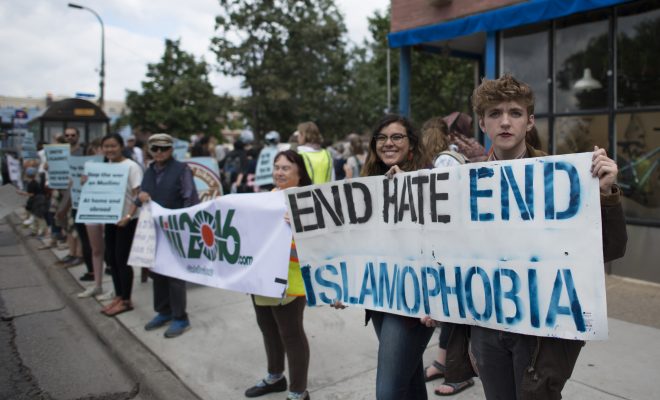 "Rally against Islamophobia and hate speech" courtesy of [Fibonacci Blue via Flickr]
"Rally against Islamophobia and hate speech" courtesy of [Fibonacci Blue via Flickr]
Crime
Research Shows a Recent Surge in Hate Crimes Against Muslims
Amid growing fear of terrorism and divisive rhetoric on the campaign trail, researchers have identified a startling upward trend in hate crimes against Muslims. According to a recent study, these crimes have reached their highest levels since the period directly after the September 11 attacks in 2001.
Brian Levin and Kevin Grisham, researchers at the Center for the Study of Hate and Extremism at California State University, San Bernardino, identified a slight rise in hate crimes overall but found a significant increase in those targeting Muslims. Using data from law enforcement officials in 20 states, they found 196 anti-Muslim hate crimes in the 2015 calendar year–a 78 percent increase from the previous year. Based on that sample, they estimate that there were approximately 260 hate crimes against Muslims across the country in 2015.
While most categories of hate crime saw either declines or slight increases, anti-Muslim and anti-Arab crimes spiked significantly, increasing by 78 and 209 percent respectively. They also found a 40 percent increase in anti-gender/transgender hate crimes. The 196 anti-Muslim hate crimes identified by the researchers in the 20 states surveyed amounted to a 29 percent increase relative to what the FBI found nationwide in 2014. The evidence for the increase in hate crimes with an Arab and gender bias came from smaller 10 and 9 state samples, respectively.
It’s important to note that these numbers almost certainly undercount the actual number of hate crimes in the United States. Incidents of hate crimes are notoriously difficult to measure–many victims may be reluctant to report these crimes and police departments may not identify hate crimes as such. And as the report notes (and I’ve previously written about), there is a significant gap between the number of reported hate crimes and the results of victimization surveys, which indicate that they occur much more frequently than these statistics suggest.
Last December, the researchers conducted a study of unofficial reports of hate crimes–largely by identifying incidents in news reports–and found evidence of a spike in the wake of the Paris shootings. With this study, they were able to build on their past findings using official data from police departments to identify an overall increase last year. “The newly available official data corroborates the December/November spike found in our earlier study,” they write. “The increase was real and material across the entire year as well.”
Trying to explain what is driving the recent increase is also particularly difficult, as causal connections are difficult to identify. But the authors note that recent rhetoric directed at Muslims is likely a factor. They point to a surge in anti-Muslim hate crimes that occurred after the 9/11 attacks in 2001. That spike dropped significantly–although it didn’t go away altogether–after September 17 when President Bush gave a speech at an Islamic center to distinguish terrorism from Islam and called for respect for American Muslims.
In contrast, they note that in the wake of the San Bernardino shootings last year, Donald Trump publicly called for a ban on Muslims entering the country. They note that after that point hate crimes against Muslims increased by 87.5 percent. Overall, the researchers identified a multi-year trend even predating the rise of Donald Trump in American politics.
The authors also note that the causes of hate crimes are extremely complicated. While hostile rhetoric may contribute to an increase in these events, there are many other factors at play. Many factors can contribute to prejudice toward a certain group and an even more complicated set of factors can explain whether a prejudice leads to violence. Ultimately, these statistics cannot provide a full picture of hate crimes in the United States, but they identify a trend that is troubling and difficult to refute.








Comments